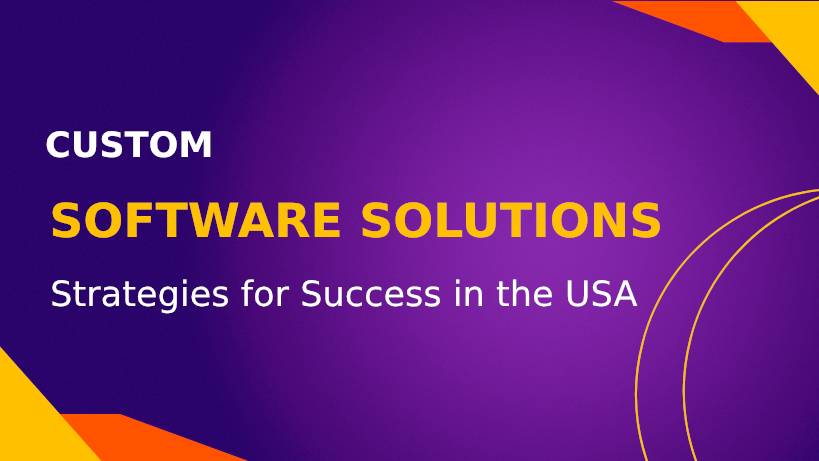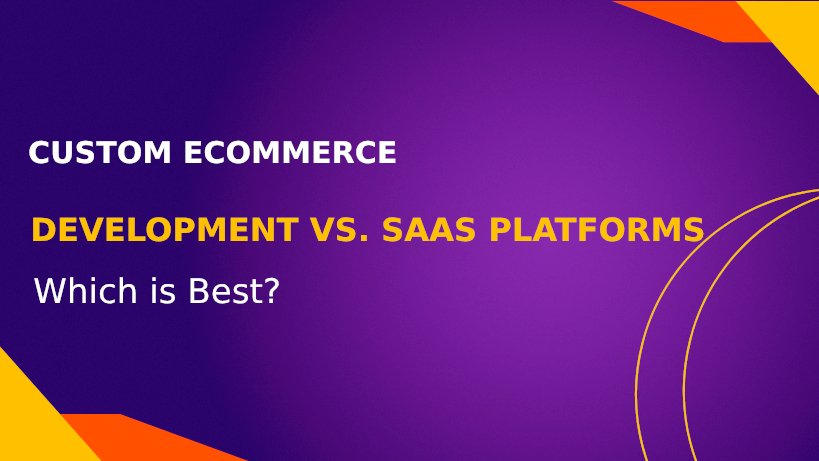
Introduction
As today's fast-changing digital environment continues to grow, businesses across the United States are investing more in custom software solutions to automate processes, enhance customer experience, and gain a competitive edge.
Instead of off-the-shelf software, custom-designed apps are specifically made for the needs of a business, therefore offering greater flexibility, scalability, and security.
The blog will course through them and particularize on the entire subject, focusing on the importance of the software, the business benefits, the best practices, and the help AnchorPoints will accomplish for enterprises to build high-performance, scalable, and secure software solutions.
What is a Custom Software Solution?
A custom software solution is the design of a particular application for a business, organization, or industry. In contrast to the widespread use of off-the-shelf software, custom software is specifically made to meet individual business requirements. Thus, it brings easier business challenges, greater integration with existing workflows, and greatly improved efficiency.
Custom software solutions are commonly used in:
- Healthcare (Electronic Health Records, Patient Portals)
- E-commerce (Custom Shopping Platforms, Payment Gateways)
- Finance & Banking (Risk Management Systems, Automated Trading)
- Manufacturing (Inventory Management, Supply Chain Automation)
- Education (E-learning Platforms, Learning Management Systems)
Key Benefits of Custom Software Solutions
-
Personalized Functionality & Workflow Integration
On the one hand, off-the-shelf software often includes many unnecessary features. On the other hand, custom software is tailor-made for a specific business. As a result, appropriate workflows can be created, which, in turn, leads to reduced inefficiency and increased productivity in general.
-
Scalability & Future-Proofing
With the enlargement of any business, the necessity of expansion is often thought of as the first and very important step. Thus, a custom software solution is a product on demand that can easily be tailored to the needs that users may have over time, and it involves dealing with more users, the implementation of more functionalities, and the inclusion of AI, a cloud, and automation.
-
Enhanced Security & Compliance
Securing data has always been the cockpit of companies' finance, healthcare, and e-commerce agenda because they naturally handle private data. Custom software solutions enable companies to use strong encryption, control access through role-based mechanisms, and comply with GDPR, HIPAA, and PCI-DSS regulations.
-
Seamless Integration with Existing Systems
The problem of a business that uses multiple legacy systems, third-party APIs, and cloud services can be solved by integrating CRM, ERP, payment gateways, marketing automation tools, and other enterprise systems—custom software guarantees such integration.
-
Improved Efficiency & Productivity
Custom software makes it easier for the company to automate duplicated tasks, streamline the data flow, and stimulate department cooperation. Ultimately, it would result in efficiency, cost savings, and increased business value.
-
Better Customer Experience & Engagement
A user-friendly interface, custom features, and mobile-responsive design allow businesses to offer a better customer experience. This favors increased engagement, customer retention, and brand loyalty.
-
Competitive Advantage
By concept, businesses will stand out more in the market through tailored software solutions. Among the functionalities that may agree with exceptions are customized analytics dashboards, AI-driven insights, and automated workflows. These make it possible to stay ahead of your competitors.
Best Practices for Developing Custom Software Solutions
- Define Clear Objectives & Business Needs: Developers should first state what their company stands for and what the goal of the software is. Questions to ask: What business problems should the software solve? What features and integrations are necessary? What technologies should be used (e.g., AI, blockchain, cloud computing)?
- Choose the Right Technology Stack: To get the best blend of security and performance, developers must choose the right backend and frontend technologies. The application may depend on the following choices of technologies for its development: Frontend: React.js, Angular, Vue.js Backend: Node.js, Python, Java, Ruby on Rails Database: PostgreSQL, MongoDB, MySQL Cloud Services: AWS, Google Cloud, Microsoft Azure.
- Adopt Agile Development Methodology: Employing Agile in software development allows for the continued feedback of anomalies, incremental parallel code improvements, and more rapid product completion. Agile development involves Sprint-based development cycles, Regular user feedback, Continuous testing, and iteration.
- Prioritize Security from Day One: More and more businesses are moving to implement data encryption, multi-factor authentication (MFA), and regular security audits to protect them from the accidental loss of sensitive data.
- Ensure UI/UX Excellence: The design experience that is barely enough for getting specification uptake is definitely. The necessary human touch is felt by the development of intuitive navigation, accessibility features, and the design of responsive systems, which then be accessible on various devices.
- Plan for Future Maintenance & Updates: The key to the whole yet difficult-to-be-seen part of the new software deployment management is to follow the techniques of continuous supervision, which presumes not only the rectification of bugs and improvement of the deficiencies found but also the incorporation of future feature upgrades. The program must be a living thing, i.e., a constant flow of work to keep the code out of trouble while it complies with regulations and is secure.
How AnchorPoints Help Achieve Custom Software Success?
At AnchorPoints, we provide unique custom software solutions that meet clients' needs using meticulous procedures that embrace industry standards and best practices.
- Tailored Custom Software Development: Software engineering and product strategy are the specializations of our team, and we work closely with clients to develop and deliver high-performance applications effectively.
- AI-powered & Cloud-Based Solutions: Integrating AI, ML, and cloud technologies in the development process has enabled us to fully use these technological capabilities for our products, including automation, analytics, and scalability.
- Seamless Integration & API Development: We offer solutions that allow clients to integrate their custom software within their CRM, ERP, e-commerce websites and third-party applications; hence, data synchronization becomes effortless.
- Security & Compliance Assurance: Our security-focused strategy involves implementing multi-layered encryption, secure authentication practices, and industry compliance standards to protect sensitive data.
- Ensure UI/UX Excellence: The design experience that is barely enough for getting specification uptake is definitely. The necessary human touch is felt by the development of intuitive navigation, accessibility features, and the design of responsive systems, which then be accessible on various devices.
- Plan for Future Maintenance & Updates: The key to the whole yet difficult-to-be-seen part of the new software deployment management is to follow the techniques of continuous supervision, which presumes not only the rectification of bugs and improvement of the deficiencies found but also the incorporation of future feature upgrades. The program must be a living thing, i.e., a constant flow of work to keep the code out of trouble while it complies with regulations and is secure.
- Industry-Specific Software Development: We provide tailored solutions in the healthcare, finance, logistics, retail, and education sectors, to mention a few.
Future Trends in Custom Software Development
- Integration of AI & Machine Learning: Chatbots and AI analytics are tools that businesses can utilize to help improve decision-making and efficiency.
- Blockchain for Secure Transactions: Finance, health care, and supply chain management utilize blockchain technology to increase transactions' security and data integrity.
- Edge Computing & IoT Solutions: Most software solutions in real-time data processing and automation utilize developed solutions with IoT (Internet of Things).
- Serverless Computing and Microservices Architecture: The prevalence of serverless computing models like AWS Lambda, Google Cloud Functions, and Kubernetes is a complete revolution in software deployment. This, in turn, has helped reduce the infrastructure costs seen by deploying such models.
- Progressive Web Applications (PWAs): Progressive Web Applications put mobile-first and offline applications within the reach of users by loading faster and delivering better performance on all devices, thus making those applications particularly attractive.
Conclusion: Future-Proof Your Business with Custom Software Solutions
Custom software adoption has been shown to increase productivity, security, and scalability. Organizations can adapt to their business models, transform in dynamic environments, enhance customer experiences, and stay competitive with customized solutions.
🚀 Ready to transform your business with a custom software solution?
👉 Contact AnchorPoints.io today for expert custom software development services tailored to your business needs!






